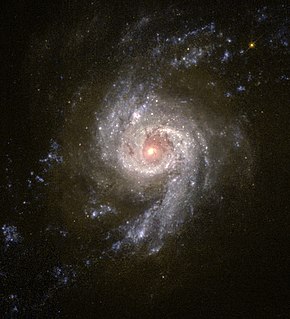| NGC 3310 | |
|---|---|
 NGC 3310, as taken by Hubble Space Telescope | |
| Observation data (J2000 epoch) | |
| Constellation | Ursa Major |
| Right ascension | 10h 38m 45.857s[1] |
| Declination | +53° 30′ 11.89″[1] |
| Redshift | 0.003309[2] |
| Distance | 34.8 Mly (10.66 Mpc)[2] |
| Apparent magnitude (V) | 11.2[3] |
| Characteristics | |
| Type | SAB(r)bc pec[3] or SAcd[2] |
| Apparent size (V) | 3.1′ × 2.4′[3] |
| Other designations | |
| UGC 5786, PGC 31650, Arp 217, VV 356, VV 406[3] | |
NGC 3310 is a grand design spiral galaxy in the constellation Ursa Major. It is a starburst galaxy and it is likely that NGC 3310 collided with one of its satellite galaxies about 100 million years ago, triggering widespread star formation. It is thought to be located approximately 46 million light-years away from the Earth, and is thought to be about 22,000 light-years wide.
The ring clusters of NGC 3310 have been undergoing starburst activity for at least the last 40 million years.[4]
Three supernovae have been discovered in NGC 3310. SN 1974C (mag. 16.5), was discovered on 26 February, 1974.[5] SN 1991N (type Ib/c, mag. 15) was spotted March 29, 1991 at an offset of 5″ east and 7″ south of the galactic nucleus.[6] SN 2021gmj (type IIP, mag.15.1) was discovered on 20 March, 2021.[7]
- ^ a b Cite error: The named reference
Skrutskie2006was invoked but never defined (see the help page). - ^ a b c Cite error: The named reference
Ann2015was invoked but never defined (see the help page). - ^ a b c d Cite error: The named reference
nedwas invoked but never defined (see the help page). - ^ Cite error: The named reference
deGrijsetal2003was invoked but never defined (see the help page). - ^ Transient Name Server entry for SN 1974C. Retrieved 24 March 2023.
- ^ Cite error: The named reference
Perlmutter_et_al_1991was invoked but never defined (see the help page). - ^ Cite error: The named reference
TNSwas invoked but never defined (see the help page).